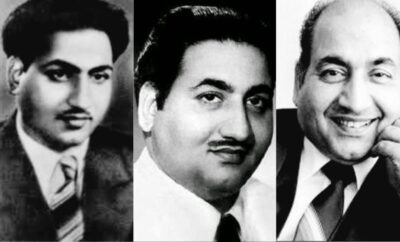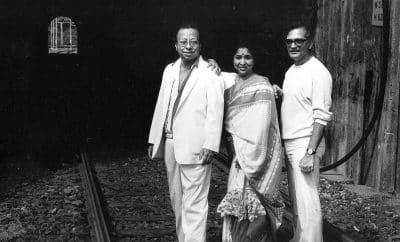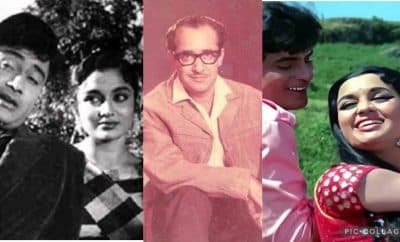People
Every Experience Leaves its Imprint on the Mind – Rakesh Anand Bakshi
Film scriptwriter, director, actor, author, photographer, swimmer, walker and cyclist juggling through all these talents, Rakesh Anand Bakshi, son of the legendary lyricist Anand Bakshi, added one more feather to his cap by becoming the author of Director’s Diaries 1 & 2. If that wasn’t enough he is also the founder of Bicycle Angels, a non-profit social initiative that helps donate bicycles to the underprivileged as a means of livelihood. Director’s Diaries is a series of conversations with Hindi Cinema’s most iconic and eminent film makers. The list includes names such as Ashutosh Gowariker, Mahesh Bhatt, Prakash Jha, Shyam Benegal, Tigmanshu Dhulia, Vishal Bhardwaj, Zoya Akhtar, Santosh Sivan, Subhash Ghai, Farah Khan, Imtiaz Ali, Govind Nihalani, Shakun Batra, Nandita Das, Tanuja Chandra. It puts the film makers, make-up artists, cinematographers, sound designers and spot boys in center stage. They talk about their journey, their debut, their craft, their struggles. It gives an insight to the perspectives of these film makers. The questions asked by the author are straight, to the point. The questions are more on the practical side of their careers rather than being preaching, vague and hypothetical, therefore the book easily serves as the guidelines for aspiring, future filmmakers. Here’s what the author has to say about the book and its making.
TheSongPedia in conversation with Rakesh Anand Bakshi.
When and how did you get into writing books? How did you choose this subject (Director’s Diaries)?
One of the reasons I became an author was to remain relevant for some special people in my life, including myself; to give my life a little deeper meaning and definite purpose when I could not make a feature film of my own over a period of ten years. Volume 1 of this book published in 2015 was my first book even though I’d never been ambitious to be one. My heartfelt gratitude to many generous and affectionate people for the same and for this subsequent volume.
A thought that has always fascinated me is, ‘Our past makes our present; our present makes our future.’ Sometime in 2002, I read in a book that David Lean, the English film director known for films like Lawrence of Arabia and Dr Zhivago, etc. used to be a tea-boy. He then became a messenger, then an editor and finally a director. It made me wonder about David Lean’s life and I thought if he hadn’t started as a tea-boy, he perhaps wouldn’t have become a director. Maybe he would not have discovered his love for films. I became interested in his life and the detours it must have taken to bring him where he was supposed to be: what did he do before he became a tea-boy? What other jobs did he have before he became an editor? What sort of friends did he have? What films did he watch and what books did he read? What determined the course of his life?
These questions led me to the idea of this book, especially when I realized how little we know about the lives and influences of the film-makers that are closer to our own reality. I had read books on directors, cinematographers, editors, etc. and about the various experiences and encounters that led them to film-making. I learnt about how they got their first break and their experiences on their first film and it made me curious about the various experiences directors of Hindi films must have had. But to my dismay, I could not find any book which documented these directors’ voices and how they ended up in film-making. I also realized that most people who aspire to be film directors often find the path to their dream unfathomable, because most of them and their families do not have background in films.
But maybe it had nothing to do with that. I belong to a family involved in films and I had studied film-making, acting and writing abroad. I had also assisted an excellent writer and director. And yet I couldn’t make a film. I wondered, sometimes almost angrily, how so many people without any background in films managed to direct films. This thirst and hunger to know how directors I admire make films urged me to interview them, to somehow know them and their creative processes better.
There was an anger in me, an angst, how today’s established directors managed to make their first film. And this curiosity and anguish is shared by thousands of others who are trying to make it into the film business. I knew there was a book here to share with not just myself, but with them too. A book these directors will help me write about how they made it here.
Some of the questions to which I had always wanted answers were: What constitutes a director, emotionally or otherwise? Can a person educate himself/herself to be a film-maker? How does one end up here and how does one get their first break in this industry? I wanted to know more about their experiences and influences as I knew that even my answers lay there.
From the many books and biographies I read on film-makers, I knew that if one were to study patterns or look for methods to come to films and to earn your first break as a director, they will be standard ones: building rare, valuable skills and honing those skills to perfection through a variety of experiences. Every experience, good or bad, rare or common, leaves its imprint on the mind.
One way to put together the puzzle of entering the world of film-making and getting to make your first film as a director is to learn from the significant experiences shared by a variety of successful and masterful directors of Hindi cinema, and to find out how they earned their first break and how they continued on this path of film-making.
My goal was to put together some significant life stories, and valuable experiences and memories of eminent and some relatively new directors. However, I wasn’t sure if anyone would be interested in such a document but I later realized how important it is to make their voices available to all those who are looking for motivation, inspiration and knowledge.
Each interview in this book left me feeling enriched and today I am more fulfilled than ever because of the things that these directors’ choices, stories, experiences and lives have taught me. And that is what I hope this book does for anyone who aspires to be something in his or her life.
It must have been a difficult task to enlist/choose the director’s for the interview. How did you work upon it?
I asked a few people whose choice of films I value, which films they have loved over the last three to four decades and made a note of similarity in their choices and mine. I saw every film or every director I interviewed TWO times before I met them for the conversation. I made sure they knew I had done that so I mentioned moments from their films even they may have forgotten, and that is one more way of earning their respect and time for the long interviews they agreed to gift me for our book. I loved, admired them from my heart and did not meet a director and human whose work I did not very deeply admire and respect.
Who was the best and the least approachable director for the interview?
Everyone was approachable, friendly, many were very busy making their next films or doing Tv so they could not meet me as easily as I may have wanted, however they did meet me and often the interviews took me more than a year to complete. It took me 4 years to write the book. I particularly LOVED Farah Khan, Subhash Ghai, Imtiaz Ali, Vishal Bhardwaj, Abhishek Chaubey, Prabhu Deva, Shyam Benegal sir I adored, Mahesh Bhatt, Anuraag Basu, Ashutosh Gowariker. These directors were professional and affectionate too, and that made me feel a little extra special.
Which director did you enjoy interviewing the most?
Farah Khan, she is an absolute adorable darling.
If it was directors from the 50s-60s, whom would you have loved to interview and write about?
Perhaps Guru Dutt, Shakti Samantha, Manmohan Desai.
Fond memories you would like to share about the moments you have shared with the directors/artists.
Almost everyone made me feel I am on a worthy journey. Vishal ji was making a film so did not have time to meet me, so i asked him if i can interview him in the car journeys when he goes from one meeting to another, so that time spent or wasted in traffic can be fruitful for us and he kindly agreed! So did Kabeer Khan.
How has writing enriched your life?
It makes me feel I am a billionaire. With riches that money can’t buy. It has given me a larger sense of my self-worth. It has given me a dream to wake up to daily. It makes me meet varied and interesting people that enriches my well of emotions and shapes my personality to be a better human being as the years go by.
An important thing I learnt from these directors’ interviews is that cinema is not a destination for most film-makers; it is a journey which continues even after one makes their first film, even after making many successful ones. I wanted to share the varied journey of these directors from their childhood to their first film because that is what shaped their lives and moulded them into the people they are today. I realized that the environment you grew up in, the choices you made as a child and an adult, the highs and lows that accompanied the choices you made, the joys and sorrows, determined your fate, led you to your first film.
Volume 2 of the book has interviews of behind-the-scene-artists (a spot boy, a make-up artist and a sound designer), what made you write about these crew members?
When I was an assistant director on various films in the period 1999 to 2005, the very first ‘friends’ I made from amongst the film crew were a Spot Boy, a Makeup artist, a Sound Designer and an Art Director. They made me feel at ease on the film set as I was intimidated by the large number of people present, many of them super successful in their professions. In this second volume, I decided to additionally feature an eminent Sound Designer and Audiographer Rakesh Ranjan, Makeup Designer Vikram Gaikwad, an Art Director and a Spot Boy (Salim Shaikh aka Action!) along with the directors. The Spot Boy is a profession some people may think as being the bottom rung of the hierarchy on a film set. However, I think the Spot Boys, the Light Men and the Art Director’s crew are the triangle that built the set for the crew to begin work on. The Spot Boys too are not less than ‘Filmmakers’. Says filmmaker Shyam Benegal … “A good spot boy is one who understands the nature of film production and anticipates on the spot requirement for one thing or another even before the production or direction department asks for it to get done. My Spot Boy, Kasim, who worked on many films with me, lived up to that.”
Tell us something about your future work.
I am waiting to be born again tomorrow. So I cannot predict what the day after tomorrow will be like.
What motivates you everyday? Your message to our readers?
To do something worthwhile for myself and the impact of my life’s purpose must serve someone else too beyond just my loved ones and myself. My life must serve a good purpose to others too. I have the right to be and must do what I need to to be healthy, wealthy, wise, kind, empathetic, loved and a caregiver for myself and others. As I come closer to the unpredictable and uncertain end of life, i must make consistent attempts to be a better person today than I was yesterday. Stay curious, stay loved, stay inspired, stay healthy.
Where to buy Director’s Diaries –



